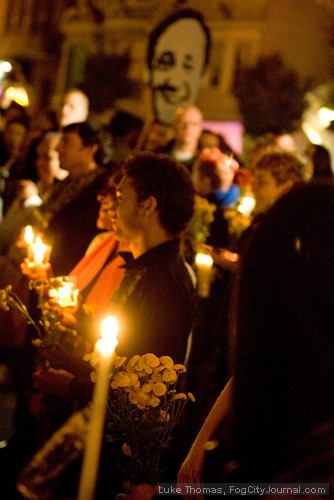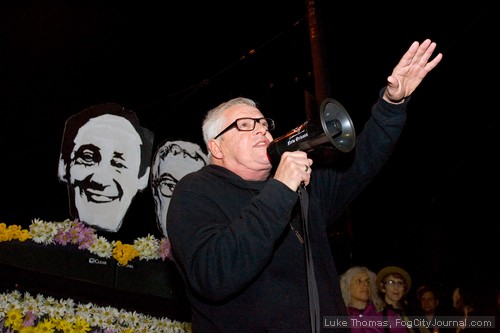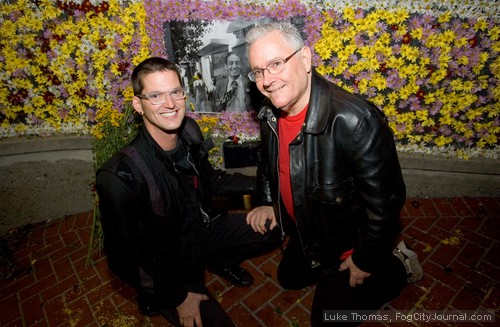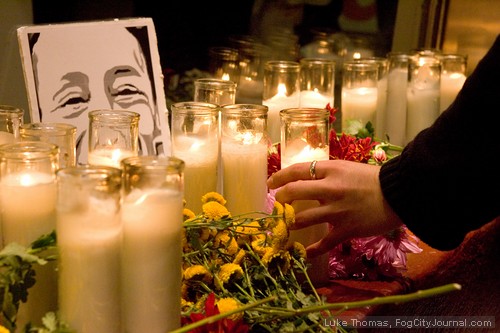
Celebrants and mourners gathered last eve for a candlelit vigil outside 575 Castro Street where former Supervisor Harvey Milk once owned a photography business. Photos by Luke Thomas.
By Luke Thomas
November 28, 2011
A gathering of San Franciscans celebrated the lives of former Mayor George Moscone and former Supervisor Harvey Milk last eve at Harvey Milk Plaza on the 33rd anniversary of their assassinations with several speakers drawing parallels between Milk’s legacy and the Occupy Wall Street movement.
Former Supervisor Carol Ruth Silver, a colleague on the Board at the time of Milk’s assassination, said Milk was more than an LGBT activist who also worked on behalf of all minorities to overcome prejudice, oppression, injustice and civil rights violations. She implored those in attendance to join the Occupy Wall Street movement and to lend support to OccupySF.
“Everyone of you who believes what Harvey believed in have to know that if Harvey were with us today, he would be there day after day,” Ruth Silver said referring to the OccupySF encampment at Justin Herman Plaza, recently renamed Bradley Manning Plaza by OccupySF.
“We want to change the system so that the system is just and fair for everybody,” added District 9 Supervisor David Campos. “We have movements building on that spirit. We have here in San Francisco the OccupySF and the Occupy Wall Street movement trying to make Wall Street and the entire financial system accountable to the 99 percent.”
“Harvey was a man of the movement,” added Milk confidant Cleve Jones. “That was his sole purpose in life.”

Cleve Jones.
Former Supervisor Dan White, a Catholic conservative, gunned down Milk and Moscone in cold blood at City Hall when White learned he would not be reappointed to his seat following his resignation.
At his trial, an all-white jury was reportedly swayed by White’s taped confession and what became known as White’s “Twinkie defense.” The jury found White guilty of manslaughter, a lesser charge that touched off a night of rioting dubbed the “White Night Riots.”
Milk was the first openly gay politician to be elected to public office in the US and his assassination occurred during a time of intense homophobia, even in San Francisco.
“Even while we’ve made tremendous strides and advances in equality, there’s still work to be done to overcome homophobia,” reflected former Harvey Milk Club President David Waggoner. “Harvey was never just about LGBT rights. It was always about, for him, justice for everyone – for workers rights, for people of color, for immigrants, for people who are homeless – and he drew those connections in a way that a lot of our current LGBT leaders do not,” Waggoner added.

Former Harvey Milk Club President David Waggoner and former Supervisor Harry Britt.
Former Supervisor Harry Britt, who was appointed by then interim Mayor Dianne Feinstein to replace Milk on the Board following Milk’s assassination, said one of Milk’s most memorable themes was a deep-rooted belief that social change is possible when people organize in numbers to address grievances.
“In terms of a larger political movement, we don’t build our hopes on our ability to please the powerful, or to live up to their norms,” Britt said. “We absolutely come together as community of people and combine our power into something that is collectively effective.”
“Harvey understood clearly that in politics, power is what matters and what he wanted was for people who are left on the margins of society, particularly LGBT people, to see their own strength, to see themselves has having possibility and hope that society had not assigned to us,” Britt added. “He hated it when we were conformist – when we tried to adapt – because he believed that that was essentially a losing strategy. What he said to me and others individually was ‘See how powerful you can be.’”




 The Hunger Site
The Hunger Site
No Comments
Comments for Lives of Milk, Moscone Celebrated
on 33rd Anniversary of Assassinations are now closed.